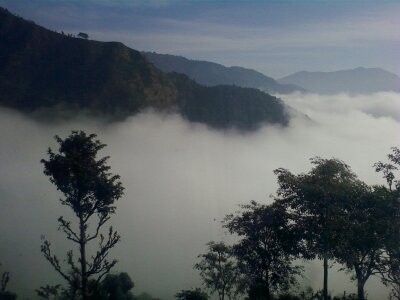
Poets use language to evoke deep thoughts and emotions in readers. Their poems can also invoke cultural histories and legends to draw connections to the present day. Next week, you can hear transcendent poems and other writing inspired by Tibet and the sacred city of Lhasa at the Rubin Museum’s Himalayan Heritage Meetup.
Tenzin Dickie, a New York-based writer and translator, is one of the writers who will read from work in Tibetan and English. Dickie brings in history and imagery to connect with her readers.
Here’s one of her poems, which details a legendary sacred site in central Nepal:
MAN KAMANA
A prose poem by Tenzin Dickie
He was at the bottom of the mountain. He wanted to get to the peak of the mountain to
the cave called Man Kamana. This meant that he would get his heart’s desire. He would
get his wish, any wish, fulfilled.
Do you need to know what he is like, this man? Do you need to know if he has a wife, or
small children, or aging parents? If he was the brightest or the second brightest or the not-
so-bright boy in his village, next to a stream that swelled into a river in the monsoon
where the goats were killed for currying?
Will that make any difference, to the knowing of his journey, our hero’s-this man
climbing a mountain-his three days’ journey through thickets and thorn bushes, rivers
and ravines, nettles and brambles?
And what of when he arrives, at the shrine, kneeling in front of the statue in the rock, the
statue naturally occurring, never made, never gilded, yet wish-granting, boon-making
and him asking this. To get back down the mountain safely.
But that’s not really true. What really happens is he waits until the Japanese come. With
their technology they install electric cars that glide with cables all the way from the
bottom to the top of the mountain.
After the reading, Robert Barnett, the Director of the Modern Tibet Studies Program at Columbia University, will moderate a panel discussion on the rich history of Tibetan literature, making connections between the writers’ own work and the sacred city of Lhasa. Even if you’ve never been to Lhasa, you’ll walk away with a deeper sense of its history and culture.
About the Poet

Tenzin Dickie is a New York-based writer and translator. Her writings and translations have appeared in Tibetan Review, Indian Literature, Cultural Anthropology, The Washington Post online, Words Without Borders, and Modern Poetry in Translation. She was a 2014-2015 fellow of the American Literary Translators’ Association. She is also an Editor at the Treasury of Lives and English Editor of Tibet Web Digest, a project of Columbia University’s Modern Tibetan Studies program. She has an MFA from Columbia University where she was a Hertog fellow and a BA from Harvard University.

